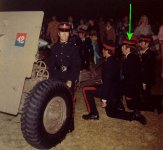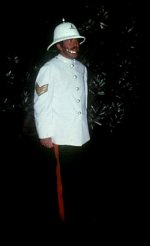Here at my desk, I listen to a selection of military music, along with a broader range of classical, polkas from old and new artists, and Volksmusi, southern German traditional music, and hunting songs. I've got a stash of CDs here, as well as a couple of YouTube playlists.
As far as martial music goes, that comes from two sources.
One is traditional German and Austrian army marches, which aren't just background tunes for bodies of troops goose-stepping past the reviewing stand, but include many well- and intricately-composed pieces. Many were composed by civilian musicians, and there is a good deal of music from civilian sources in it-from operas and operettas, for example, and from traditional German folk music. The Austrian marches do tend to be a little more lyrical than the other German tunes.
The other is John Philip Sousa's body of work. While he fits into the broader community of music in the West in his day, I think he established a uniquely American style of march music. And to me, his music fits so well with summer in a small town or small city, and especially to celebrating the Fourth of July. Also, Sousa marches are perfect for keeping time and pace when I walk for exercise. I can "hear" them in my head, and I run through a collection of his marches, in the same sequence, when I do a four- or five-mile walk at home.
But the first tune I listen to every weekday, regardless of anything else I may listen to after that, is Ron Goodwin's "Aces High", aka "the Luftwaffe March" from his soundtrack for "The Battle of Britain". Goodwin is an excellent composer, generally, but in that piece, Goodwin, an Englishman very familiar with the British military music tradition, created a piece that sounds authentically German. Many people who hear it and have no more than a passing knowledge of the subject think it's a German march.
Prost!
Brad








